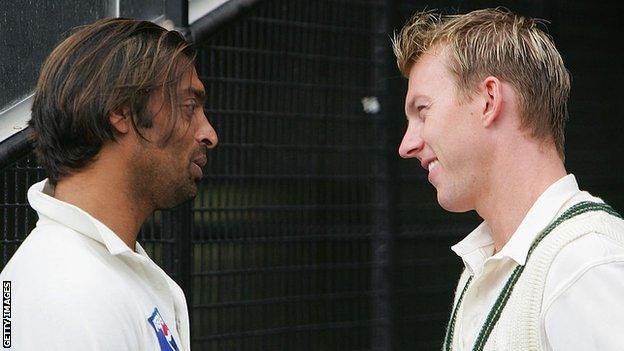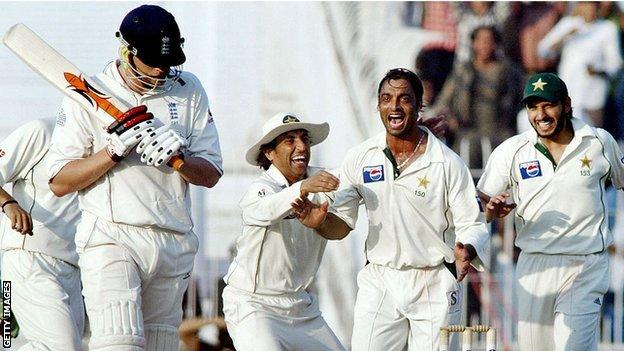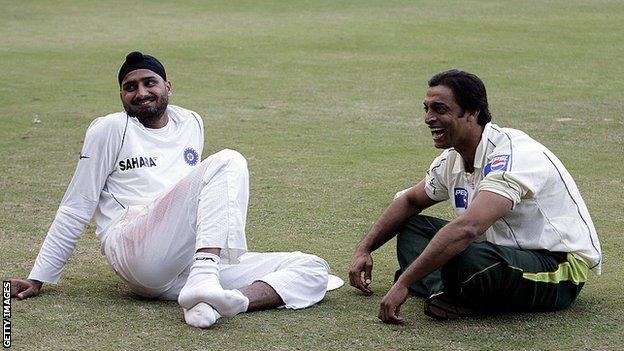Shoaib Akhtar: Ex-Pakistan bowler on duels with Andrew Flintoff and injuring Yuvraj
- Published
'No amount of training could prepare you to face Shoaib Akhtar'
The quickest bowler in cricket history, on and off-field run-ins with opposition players and even an offer to play the lead role in a Bollywood film, external - former Pakistan seamer Shoaib Akhter was a headline act.
Nicknamed the "Rawalpindi Express", Shoaib was the first bowler to break the 100mph mark. He retired in 2011 having taken 444 international wickets across the three formats.
As Pakistan prepare for the first Test in a three-game series against England, Shoaib has been speaking to BBC's TMS commentator Isa Guha and Aatif Nawaz on the BBC's TMS podcast.
The 44-year-old reflects on the moment he clocked 100mph on the speed gun, tells anecdotes of sledging - including some verbals with England's Andrew Flintoff - and shares his views on how fast bowling has changed in recent years.
'I trained for it' - bowling 100mph at the 2003 World Cup
At the 2003 World Cup, Shoaib made history by becoming the first bowler to be officially clocked at 100mph. It came against England in Cape Town and Nick Knight was the batsman.
Shoaib: Breaking the 100mph barrier wasn't a big deal to me. It was just media hype, an international cricket gimmick. I wasn't getting paid for this - to break my bones trying to bowl that fast.
I just thought: "For heaven's sake, I need to finish this and just do it." So I planned it all out, I started training for it.
I ran with 170kg weights on my back, taking 20kg off after every 100 metre sprint. I also used to bowl from 26 yards with something much heavier than a cricket ball. When I came back to the 22 yards, I was about 6km/h (3.7mph) quicker.
I planned to bowl it against Nick Knight. I said to him: "I'm going to hurt you, so make sure you stay out of the way.' I told him I'd bowl 100mph in that over, on that exact ball.
'Laws don't allow you to bowl fast now'

Shoaib and Australia's Brett Lee, the two quickest bowlers in cricket history, shared a friendly rivalry on the field
Australians Brett Lee, in 2005, and Shaun Tait (2010) both clocked 100.1mph. They are the only other men to reach the the 100mph landmark
Shoaib: We weren't showboating kind of people but we enjoyed being the centre point of the ground. When you're running, you make sure the whole focus is on you - the game, the crowd, the media. The box office hit has to be us.
Ten years ago, bowlers would bowl 155kph (96.3mph) and now they're all of a sudden bowling 135km/h (83.9mph). We now only have a few real fast bowlers around the world. Back in the day, South Africa alone had six.
The cricket laws don't allow you to bowl fast now: two new balls, too much restriction, too much cricket, too many Twenty20 leagues, too much money, too many TV rights.
Players are now getting smarter and more focused on money; they want to save their careers and legs and play for 10 years - whereas I would fight for that specific series only, I fought for the day.
The laws were more relaxed back then. When they banned us from bowling more than two bouncers I was gutted. I was like: "How do you trap the batsman? Where is the bodyline bowling?"
Please allow me to hit the guy and let him hit me back. This is what you want to see in international cricket. I'm sick of seeing this lame, prim and proper cricket.
Breakfast scuffles with Hayden, verbals with Flintoff

Shoaib made his international debut in 1997 and played 46 Tests, 163 ODIs and 15 Twenty20s for Pakistan
Shoaib's trademark long run-up, raw pace and seemingly aggressive nature produced fierce battles with opposing batsmen.
Shoaib: There are no characters left in the game. Apart from Ben Stokes, where are they? The ones who are up for the fight?
Me and Australia's Matthew Hayden once got into a fight at breakfast - we were wanting to hurt each other. Then when we got into the ground there was a verbal war. He's twice the size of me but I told him size doesn't matter in the fight.
What we did with each other was very bad but the crowd loved it, I loved it, he took me on.
I said to him: 'You're not a better-looking cricketer than me, you're very ugly so I want to get you out and get rid of you so I don't see your face.'
Once, in the ICC Super Series,, external I was injured and I told Freddie [Andrew] Flintoff I was not fit. He said: "You were born unfit' and 'you look like a Tarzan but you bowl like a Jane'.
So when he was next touring Pakistan, the verbal wars started with Flintoff. I told him he had woken me up by what he said to me back in Australia.
In that series, I bowled the fastest ever. My last spell was faster than the first one. Freddie was badly hurt, he had no answers, I got him out a few times in that series.
But these are the types of characters that need to re-emerge in the game.
'A lone ranger who didn't realise his own power'

Shoaib (right) shares a joke with Indian cricketer Harbhajan Singh during a Test match between India and Pakistan in Bangalore in 2007
Shoaib reflects on his relationship with Pakistan team-mates and responds to a story he once wrestled India cricketers Harbhajan Singh and Yuvraj Singh in a hotel room.
I don't wrestle, it's my way of showing my affection to other people and I basically crossed the line. When I like someone, I throw them.
I broke Yuvraj's back, have previously broken Shahid Afridi's rib by hugging him, and I made Abdul Razzaq stretch his hamstring a bit too much.
So my way of loving people is a bit wild. It was just me being stupid in my younger days but I never realised my own power.
I got into a fight once or twice in my career but I enjoyed a great relationship with my team. Maybe not the Pakistan Cricket Board, but with my team-mates I had a great time.
Although I enjoyed playing cricket with my team-mates, I never enjoyed hanging out with them afterwards. I was basically a lone ranger.

Louis Theroux: Eight things we learned when he spoke to Joe Wicks
6 Degrees from...Thierry Henry: Six calls to track down the football legend
